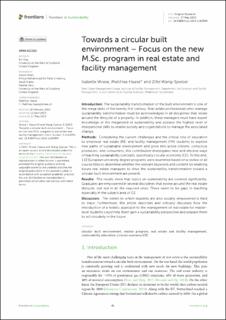Please use this identifier to cite or link to this item:
https://doi.org/10.21256/zhaw-27895Full metadata record
| DC Field | Value | Language |
|---|---|---|
| dc.contributor.author | Wrase, Isabelle | - |
| dc.contributor.author | Haase, Matthias | - |
| dc.contributor.author | Wang-Speiser, Zifei | - |
| dc.date.accessioned | 2023-05-25T14:57:09Z | - |
| dc.date.available | 2023-05-25T14:57:09Z | - |
| dc.date.issued | 2023-05-17 | - |
| dc.identifier.issn | 2673-4524 | de_CH |
| dc.identifier.uri | https://digitalcollection.zhaw.ch/handle/11475/27895 | - |
| dc.description.abstract | Introduction: The sustainability transformation of the built environment is one of the mega tasks of the twenty first century. Real estate professionals who manage sustainability transformation must be acknowledged in all disciplines that reside around the lifecycle of a property. In addition, these managers must have expert knowledge of the megatrend of sustainability and possess the highest level of interpersonal skills to enable society and organizations to manage the associated change. Methods: Considering the current challenges and the critical role of education to empower real estate (RE) and facility management (FM) students to explore new paths of sustainable development and grow into active citizens, conscious producers, and consumers, this contribution investigates new and elective ways of teaching sustainability concepts, specifically circular economy (CE). To this end, 122 European university degree programs were examined based on a review of all course titles to determine whether the relevant keywords and content for enabling future real estate managers to drive the sustainability transformation toward a circular built environment are present. Results: The results show that topics on sustainability are covered significantly. Graduates are empowered in several disciplines that evolve around the real estate lifecycle, but not in all the required ones. There seem to be gaps in teaching especially in the subject area of CE. Discussion: The extent to which students are also socially empowered is hard to trace. Furthermore, this article describes and critically discusses how the introduction of a holistic approach to the management of real estate for master-level students could help them gain a sustainability perspective and prepare them to act circularly in the future. | de_CH |
| dc.language.iso | en | de_CH |
| dc.publisher | Frontiers Research Foundation | de_CH |
| dc.relation.ispartof | Frontiers in Sustainability | de_CH |
| dc.rights | http://creativecommons.org/licenses/by/4.0/ | de_CH |
| dc.subject | Real estate | de_CH |
| dc.subject | Circular economy (CE) | de_CH |
| dc.subject | Education | de_CH |
| dc.subject | Circular built environment | de_CH |
| dc.subject | Master program | de_CH |
| dc.subject | Real estate and facility management | de_CH |
| dc.subject | Sustainability education | de_CH |
| dc.subject.ddc | 658.2: Facility Management | de_CH |
| dc.title | Towards a circular built environment : focus on the new M.Sc. program in real estate and facility management | de_CH |
| dc.type | Beitrag in wissenschaftlicher Zeitschrift | de_CH |
| dcterms.type | Text | de_CH |
| zhaw.departement | Life Sciences und Facility Management | de_CH |
| zhaw.organisationalunit | Institut für Facility Management (IFM) | de_CH |
| dc.identifier.doi | 10.3389/frsus.2023.1163394 | de_CH |
| dc.identifier.doi | 10.21256/zhaw-27895 | - |
| zhaw.funding.eu | No | de_CH |
| zhaw.issue | 1163394 | de_CH |
| zhaw.originated.zhaw | Yes | de_CH |
| zhaw.publication.status | publishedVersion | de_CH |
| zhaw.volume | 4 | de_CH |
| zhaw.publication.review | Peer review (Publikation) | de_CH |
| zhaw.webfeed | Real Estate Management (IFM) | de_CH |
| zhaw.author.additional | No | de_CH |
| zhaw.display.portrait | Yes | de_CH |
| zhaw.monitoring.costperiod | 2023 | de_CH |
| Appears in collections: | Publikationen Life Sciences und Facility Management | |
Files in This Item:
| File | Description | Size | Format | |
|---|---|---|---|---|
| 2023_Wrase-etal_MSc-program-real-estate-and-facility-management_frsus.pdf | 741.3 kB | Adobe PDF |  View/Open |
Show simple item record
Wrase, I., Haase, M., & Wang-Speiser, Z. (2023). Towards a circular built environment : focus on the new M.Sc. program in real estate and facility management. Frontiers in Sustainability, 4(1163394). https://doi.org/10.3389/frsus.2023.1163394
Wrase, I., Haase, M. and Wang-Speiser, Z. (2023) ‘Towards a circular built environment : focus on the new M.Sc. program in real estate and facility management’, Frontiers in Sustainability, 4(1163394). Available at: https://doi.org/10.3389/frsus.2023.1163394.
I. Wrase, M. Haase, and Z. Wang-Speiser, “Towards a circular built environment : focus on the new M.Sc. program in real estate and facility management,” Frontiers in Sustainability, vol. 4, no. 1163394, May 2023, doi: 10.3389/frsus.2023.1163394.
WRASE, Isabelle, Matthias HAASE und Zifei WANG-SPEISER, 2023. Towards a circular built environment : focus on the new M.Sc. program in real estate and facility management. Frontiers in Sustainability. 17 Mai 2023. Bd. 4, Nr. 1163394. DOI 10.3389/frsus.2023.1163394
Wrase, Isabelle, Matthias Haase, and Zifei Wang-Speiser. 2023. “Towards a Circular Built Environment : Focus on the New M.Sc. Program in Real Estate and Facility Management.” Frontiers in Sustainability 4 (1163394). https://doi.org/10.3389/frsus.2023.1163394.
Wrase, Isabelle, et al. “Towards a Circular Built Environment : Focus on the New M.Sc. Program in Real Estate and Facility Management.” Frontiers in Sustainability, vol. 4, no. 1163394, May 2023, https://doi.org/10.3389/frsus.2023.1163394.
Items in DSpace are protected by copyright, with all rights reserved, unless otherwise indicated.